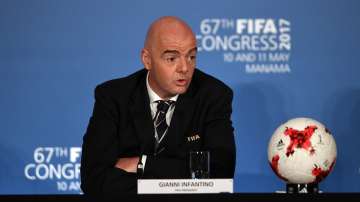The 2018 World Cup champion will get $38 million from a prize fund FIFA has increased by 12 percent to $400 million.
FIFA said on Friday that each of the 32 competing national federations in Russia will get at least $8 million, the same as in 2014 when the overall prize fund was $358 million.
Three years ago, World Cup champion Germany received $35 million and runner-up Argentina got $25 million. Next year, the runner-up will also get a $3 million increase to $28 million.
Following a meeting of the FIFA Council, the governing body said the third- and fourth-place teams will each get a $2 million increase to $24 million and $22 million, respectively. The quarterfinalists will each get $16 million, also a $2 million increase and teams eliminated in the last 16 get a $3 million increase to $12 million.
The prize fund comes from World Cup revenues that FIFA has projected to exceed $5 billion despite stalled sales of sponsorships amid Swiss and American corruption investigations.
"Today the doors are open, the revenues come in and the revenues will exceed the budget certainly," FIFA President Gianni Infantino said.
FIFA also moved to unblock a $100 million fund from 2014 World Cup tournament revenues for host Brazil which has been frozen in the fallout from corruption investigations.
FIFA promised the money in 2014 for "women's and grassroots football, healthcare and social programs for underprivileged communities" in Brazil.
The fund was agreed to with Brazilian soccer leaders Jose Maria Marin and Marco Polo del Nero, who have both been indicted by the U.S. Department of Justice in a sprawling bribery and racketeering case. Marin's trial begins in Brooklyn federal court next month, and Del Nero has remained in Brazil to evade arrest while still president of the national soccer body.
Infantino said Friday a new entity would run the fund, and projects should start to benefit the country by early next year.
Also, FIFA has ended a years-long attempt to bring soccer peace between the Israeli and Palestinian federations.
The talks, begun by Infantino predecessor Sepp Blatter, tried to resolve the issue of teams from Israeli settlements on disputed land playing in Israeli competitions in apparent breach of FIFA statutes.
"We see there where our limits unfortunately are," Infantino said, noting disputes in the region date back "10,000 years."
"Football is not going to solve them either, I am afraid," Infantino said.
Council members decided that "interference by FIFA in the (soccer) status quo in these territories, could have an aggravating effect on the current circumstances."

